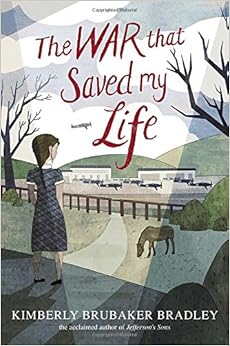 The War That Saved My Life
The War That Saved My LifeKimberly Brubaker Bradley
Penguin, 2015 316 pgs
Grades 5-7
Historical Fiction
Ada has spent her whole childhood in a dingy London flat above the pub where her mom works. Her only companion is her brother Jamie, who escapes from the house most of the day. Ada can't leave. She has a clubfoot and her abusive mother won't take her to a doctor or allow her out of the house and into the public. When children are being evacuated from London at the start of World War II, Ada sees her chance. She limps to the train station with the help of a kindly neighbor and ends up in a sea town on the coast of Kent. Ada and Jamie are taken in by a cranky and sad lady named Susan, who doesn't seem to want the children. Left to their own devices, they enjoy fresh air and healthy food for the first time in their deprived lives. Ada discovers a pony formally belonging to Susan's recently deceased companion . Ada falls in love with the pony and teaches herself to ride. The two children slowly begin to adjust to country life and learn to trust Susan. Susan begins to warm up to them and to find healing and purpose now that she has the children in her life. The war heats up and with it come air-raids, bombs, volunteering for the war effort, and rationing. Through it all, Ada and Jamie grow and mature, finding confidence and learning to trust the people around them. Ada discovers that just because her foot doesn't work, her brain does. She finally allows Susan to teach her to read and write and even manages to catch a spy and demand that the police take her seriously. Just when the children are starting to relax into their new lives, their mother returns and wants them back. What follows is both heartbreaking and heart-warming and all around fully satisfying.
The War That Saved My Life is my new favorite book. I did not read it when it first came out over last winter because I thought the subject matter seemed boring and kids wouldn't pick it up. Because of all the wonderful reviews it has received, I finally broke down and read it. Boy, was I glad I did! Although at over 300 pages the book appears to be a little long, it reads really fast. The plot moves along quickly and it is absorbing from the very first page. The abuse Ada suffers from her mother is hard to read and understand. Children will be rooting for Ada's escape and healing every step of the way. Written in the first person, Bradley keeps Ada's voice consistent and we experience right along with her the wonder of new things, such as changing leaves and green grass. Ada's thought patterns become more complex as she grows in maturity and wisdom. When the mother returns it is difficult to read now that Ada is on the road to healing, but it is necessary for her to face her fears and take control over her destiny in order to achieve closure with her past abuse. Themes of the misery that is war will still ring true today, as will the healing power of animals and the importance of living in community. I am currently watching a PBS series taking place on the rural home front of World War II. This book served as a perfect companion to my watching. The World War II experience through the eyes of a British child is unusual to American children's books. Add the dimension of overcoming a handicap and abuse, as well as a powerful plot and you have a worth while and enjoyable read.
No comments:
Post a Comment